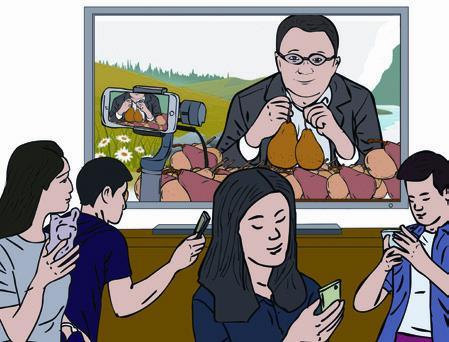Is Live-Stream Marketing by Officials a Good Idea?

With the novel coronavirus disease(COVID-19) pandemic effectively under control in China, the countrys economic activity is expected to recover soon.
However, many farmers are struggling to offload agricultural products that were hard to sell during the shutdowns that marked the peak of the outbreak. In the hardest-hit Hubei Province in central China, local offi cials are livestreaming on e-commerce platforms to pitch products on behalf of local farmers, in a bid to convince more people to buy them. So far, it has proved an effective means of advertising.
In Honghu, a city in Hubei, consumers rushed online to order locally grown lotus root after local officials pitched the product during a live-stream. In the city of Yichang, 40,000-kg navel oranges sold in one day thanks to offi cialsonline promotion.
As a result, e-commerce platforms are be- coming more active in live-stream marketing to help farmers sell their products, with a growing number of offi cials joining in.
On one hand, the public has voiced their support for offi cials active involvement in such marketing schemes, considering it an innovative and effective method of helping farmers make more money. Yet there is some concern that officials should not lower themselves to hawking goods. They should instead portray a responsible image of the government by contributing to farmers incomes in a more profound way.
An effective way to help
Wang Qingfeng (Nanfang Daily): The public find it refreshing to see local government officials live-streaming. More importantly, these appearances endorse the quality of the products they are advertising, and so it comes as no surprise that consumers have rushed to buy them.
The live-stream advertisement of farm produce by government offi cials is a very real way to lift people out of poverty. By the end of 2019, 58,000 people in Hubei still lived in poverty, while the lives of countless ordinary families were disrupted by the pandemic, forcing many back below the poverty line. Finding channels for the sale of farm produce is important to these people, while the massive reentry of agricultural produce into the market will boost other sectors, lifting the overall economy. In this sense, these offi cials deserve praise. At the very least, their actions show that they care about the prosperity of local farmers.
It is not all that easy for offi cials to step into live-stream marketing. Often facing an audience of millions, they are scrutinized for their communication techniques and flexibility of response in ways they havent experienced before.
Simply reading a script is not enough. They must display knowledge of agriculture, relate to the struggle of farmers and exhibit an understanding of the market. These requirements enable offi cials to know more about the experience of people at the grassroots of society.
Despite the challenges, Hubeis officials have shown a determination to help farmers. Attempts of this kind should be welcomed.
Gu Huiming (www.qdnrbs.cn): Farm produce in many places across the country has been unsellable due to the disruption caused by COVID-19. Government offi cials have been livestreaming to pitch farm produce by making use of their high-profi le identities. As a result, sales of these products have begun to rise and local economies are starting to recover after months of lockdown.
Recent years have seen live-stream marketing grow rapidly. This form of advertising is popular with the public, and has brought a lot of excellent products to consumers.
Live-stream marketing by officials derives its success from government credibility. For the audience, the appearance of these offi cials on live-streams is immediate confirmation of the quality of products or the level of services that they are promoting. It can shorten the time needed for consumers to develop trust in certain products. Sales naturally rise, bringing positive results.
This form of advertising products and boosting local economies should be widely adopted, especially at a time when so many farmers are plagued by the difficulty of selling products. It is likely that more officials will join this new team of live-stream marketers, while more and more products are advertised on these platforms. These measures can boost the income of farmers.
More things to be done
Wu Jianing (Guangxi Daily): With the credibility that comes with authority, live-streaming by government offi cials has proven more effective than more routine forms of advertisement.
This form of marketing has greater implications for the synthesis of agriculture and the Internet, injecting vitality into the development of the whole sector.
However, officials can only occasionally get involved in marketing activities. After all, they have duties within government departments as well as other responsibilities. This drive has, to some extent, been more about publicity than real sales. Maintaining the sale of agricultural produce is a long-term project, and limited live-streaming activities will not be enough on their own.

Therefore, in addition to policies that facilitate the sale of farm produce, farmers themselves should learn marketing techniques and become influencers online to sell more goods.
Su Tongmin (www.sxdaily.com.cn): Government officials in several places have been live-streaming on e-commerce platforms like JD.com and Tmall.com to pitch local agricultural products. The results have been remarkable, and the cohort of live-streaming offi cials is growing.
This has undoubtedly proved an efficient way of selling goods, but given that professional Internet influencers are sometimes embarrassed after praising poor products online, it is important that offi cials new to this business undertake a certain level of preparation before appearing in front of a live-streaming audience.
They must act responsibly by having a clear idea of what it is they are promoting. The quality or function of products should never be exaggerated, as this would amount to cheating their audience.
As government officials, they must re- member that they represent the governments credibility and authority. It is therefore important for officials to truly devote themselves to this if they choose to undertake this work, even though it does not fall under their usual remit.
Li Jiming (www.voc.com.cn): Through livestreaming, officials are not only pitching farm products, but helping to eradicate poverty. The usual commodity distribution channels are not yet fully restored, and farmers are fi nding it hard to clear their inventories.
With the innovative help of these offi cials, farmers are fi nding it easier than ever before to sell their products. In doing so, not only are their incomes rising, but the distance between the government and public is narrowing. The problem is that government officials now have a lot of work to do and it is unrealistic for them to go on regularly livestreaming. Many have done so for shortterm gain, to make this years economic performance for their county or prefecture look more robust. The question now is how to convert the trend into something more sustainable. As representatives of authority, government officials are restricted by Party and state discipline. Their involvement in live-stream marketing is a publicity stunt which isnt strictly governed by any rules.
In this sense, it is necessary to quickly produce rules and mechanisms to standardize livestream marketing practices by government officials. A clear code of conduct will dispel suspicion of private gain by exploiting authority. They must have official documents to support their live-streaming activities and assuage peoples concerns. Only in this way can their development be sustainable.
While on the surface live-stream marketing seems easy, a professional quality is hard to achieve. Government officials are new to this industry, mostly lacking in online marketing knowledge, and so it is important for them to be trained and equipped with techniques related to blockchains, big data and 5G.
Equally important is boosting the competitiveness of local products, and ensuring that officials are truthful about the products they back. Since the attempts have yielded positive results, live-stream marketing by offi cials should be allowed so long as it is helping farmers increase their income.

